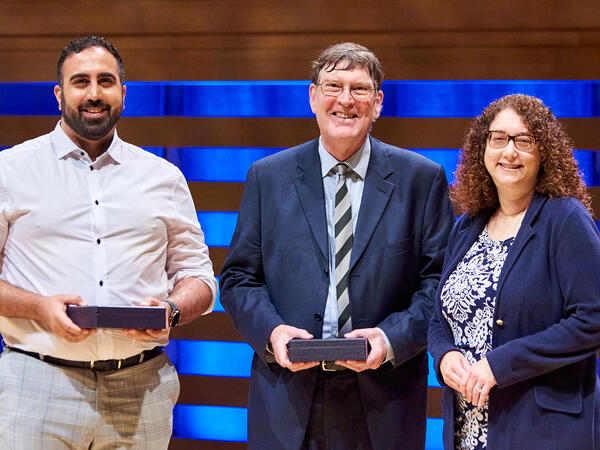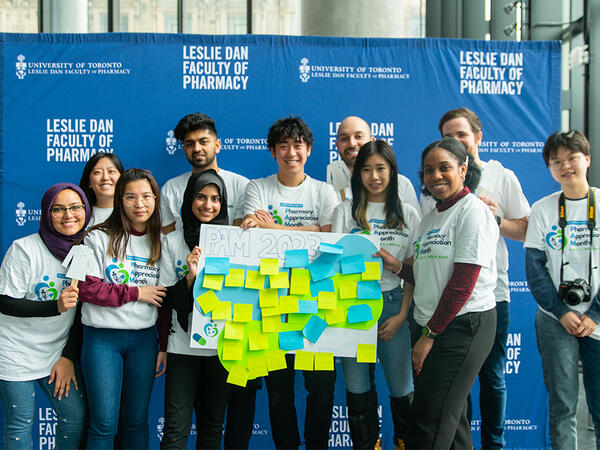
Ian
Crandall
During his 30 years at the University of Toronto, Dr. Ian Crandall undertook research work into the diagnosis, treatment and pathophysiology of the parasite Plasmodium falciparum, the causative agent of the most lethal form of malaria. Through the use of P. falciparum grown in culture he examined methods to improve the detection of P. falciparum in blood samples by immunodetection, light scattering and imaging methods. Further, in collaboration with multiple synthetic chemists he screened libraries of both novel synthetic chemicals and natural compounds for their potential activities as antimalarial agents.
Dr. Crandall is retired from the Leslie Dan Faculty of Pharmacy. During his time at the faculty, he served as Associate Dean, Academic in 2012, and the Chair of the U of T Animal Care Committee from 2015-2023.
Education and Academic Appointments
Education
- BSc. (Biochemistry, Queen’s, 1981), MSc. (Biochemistry, Queen’s, 1983), D.Phil (Biochemistry, Oxford, 1987), Post Doc Fellow (University of California, Riverside, 1983-88)
Academic Appointments
- Academic Appointments: Department of Medicine (U of T 1995-99), Department of Laboratory Medicine and Pathobiology, U of T (1999-23), Department of Pharmaceutical Chemistry, U of T (2005-24)
Research & Scholarly Contributions
Ian Crandall has produced publications that have examined ways of improving the diagnosis of malaria by using fluorescent dyes (“The use of fluorescence enhancement to improve the microscopic diagnosis of falciparum malaria.” Malar J, 6:89-97 (2007)), have examined how malaria diagnosis can be improved using lost cost alternative light sources, such as light emitting diodes ( “An informatics model for guiding assembly of telemicrobiology workstations for malaria collaborative diagnostics using commodity products and open-source software” Malaria Journal 2009, 8:164-175 (2009)), and how to reduce the impact of counterfeit or low potency medications (“Pill characterization data streams for reducing exposure to inadequately identified anti-malarial medication in developing countries” Malaria Journal , 9:194-170 (2010))
In collaboration with several synthetic chemists (Dr. Lakshmi Kotra, Dr. Walter Szarek and others), Dr. Crandall has explored several classes of novel antimalarial agents that are able to inhibit the entry of malaria parasites into erythrocytes, or interfere with the parasite’s metabolism. This work has several goals:
- To develop lead compounds for further evaluation as antimalarial agents;
- To use the compounds we have designed and synthesized as tools to discet the mechanisms by which Plasmodium gains entry to erythrocytes
- To examine how the presence of various receptor domains are essential to innate immunity.
Dr. Crandall and his collaborators has designed and developed six distinct generations of new agents with broad anti-Plasmodium activities (Biochemical Pharmacology 73(5): 632-42, (2007) & Bioorg Med Chem 16:1927-1947 (2008)) and their current lead compounds can be synthesized in a small number of steps using low-cost reagents. Their original work involved formulating agents which blocked the red cell receptor involved in the first recognition events, however subsequent generations of compounds have focused on targeting the parasite ligand. This work has lead to the development of new chemical entities with LD50 values in the low nanomolar range which have yielded positive results in mouse malaria models. Several patents have been filed to protect this technology and we are currently seeking a partner for commercial development.
Dr. Crandall continues to work with several medicinal chemists to screen compounds for antimalarial properties. This work involves testing individual compounds for activity in Plasmodium falciparum cultures and then performing follow-up work to determine potential mechanisms for compounds which display preferential toxicity for Plasmodium. Compounds that have shown exceptional potential have been taken as far as animal models for malaria, e.g., P. berghei and some have been taken to the stage where they are used for challenges involving human P. falciparum in NOD/SCID mice.
Professional Impact
Dr. Crandall served as a coordinator and active participant in the Jay Keystone Tropical Disease Rounds held in the Toronto General for 30 years. In this position, he instructed the residents and microbiology fellows in the diagnosis of tropical and neglected diseases.
Ongoing Engagement
Dr. Crandall is currently enjoying my retirement in Eastern Ontario, however, he continues to participate in the Youth Summer Program, which introduces high school students to science and promotes the University of Toronto.
Awards
- Leslie Dan Faculty of Pharmacy Professor of the Year (2021-2023)
Publications
Keywords: malaria, P. falciparum, antimalarials, neglected diseases, laboratory medicine


